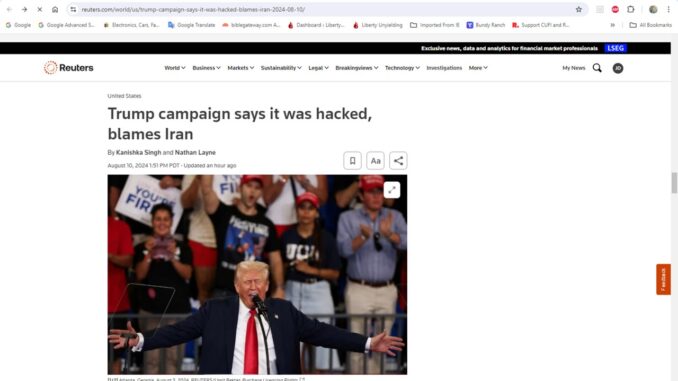Funny stuff with computers is alleged. Earmarks not said to be involved.
J.E. Dyer, a retired Naval Intelligence officer, blogs as The Optimistic Conservative, August 2, 2024

Non sequiturs and elliptical misrepresentations are at the heart of this, which tells me there’s a narrative being spun.
It’s not clear exactly what’s in view, but Chris Krebs, former head of DHS’s Cybersecurity and Infrastructure Security Agency (CISA), weighed in on 10 August to place two specific narrative points that are probably clues.
First the theme. The theme is being reformulated by the media; indeed, was instantly being reformulated as soon as the Trump campaign had been induced to utter words about Iran possibly having hacked Trump campaign documents. This tweet I posted states accurately what happened:
The first public emission was an 8 August 2024 security announcement from Microsoft, which said flat-out that an entity associated with Iran had spear-phished the email account of a senior political campaign official. Microsoft didn’t say which campaign.
Politico then reported that an anonymous actor calling himself “Robert” had been sending Politico pilfered Trump campaign documents since 22 July 2024. Politico asked for comments from the Trump campaign, which acknowledged being hacked.
It also, as recounted by Politico, “blamed ‘foreign sources hostile to the United States,’ citing a Microsoft report on Friday that Iranian hackers ‘sent a spear phishing email in June to a high-ranking official on a presidential campaign.’”
Politico implies, though it doesn’t say outright, that someone in the Trump campaign verified the authenticity of files sent to Politico by “Robert.” The exact wording refers to “two people” but doesn’t say they’re with the campaign: “The documents are authentic, according to two people familiar with them and granted anonymity to describe internal communications.”
Since Politico squeezed that narrow acknowledgment out of the Trump campaign, the media have run headlines claiming that the Trump campaign suggests Iran hacked its systems – as if that somehow happened without Microsoft categorically declaring that Iran had phished a campaign system user, or Politico announcing it was receiving documents pilfered from the Trump campaign.

If there’s no 2 and 2 to put together there, shame on the media for presenting the matter as if there is.
So that immediately has my attention. Microsoft and Politico have together put out information that anyone would interpret as meaning Iran probably hacked the Trump campaign. But the obvious interpretation is being presented as if the Trump campaign came up with that analysis – or suspicion, or conclusion.
People who’ve lived through the last two presidential elections and remember all the deceptive and disingenuous media themes are finding this hard to accept at face value. Instantly attributing the suspicion about Iran to the Trump campaign, rather than to the foundational data point from Microsoft, looks intentionally misleading. It screams intentionally misleading.
Now comes Chris Krebs to place his two theme points.
Here’s his tweet.
Here are the two themes. First, a false theme that “someone is running the 2016 playbook.” By this, Krebs undoubtedly means “someone” is hacking the Trump campaign in order to expose its secrets and make it look bad. That’s what the Democrats and media accused Russia of doing in 2016. (Politico’s article makes the same reference to 2016.)
Except that that was never anyone’s playbook in 2016. The 2016 playbook was the DNC and Hillary Clinton concocting “evidence” against Trump using Fusion GPS and its Star Wars bar-scene cast, in order to help the FBI fool the FISA court into granting surveillance authority for Carter Page.
The “Russian hacking” narrative of 2016 seems to have been based on something that actually happened, although we’ll never know for sure how much of it actually happened. The FBI never saw the evidence of it directly. The evidence has been in the custody of the commercial cybersecurity company CrowdStrike from June 2016 until today.
But in any case, if you had to be reminded of that “Russian hacking” narrative in order to connect it to the new “Iranian hacking” narrative, you are surely in good company. Your memory has to be jogged because it wasn’t a playbook that mattered in the slightest in 2016. It had no effect on the election. It was a weird collateral event; much lamented by the Democrats, to be sure (N.B.: the Russians also tried to hack the RNC system, according to the FBI), but without any meaningful consequence to the course of the election.
So calling it “the 2016 playbook” is a Democratic talking point for 2024 being placed by Mr. Krebs. In light of his second point, it looks like we’re supposed to read “2016 playbook” as a “threat to democracy,” the Democrats’ garbled, frankly inane complaint about the “Russian hacking” in 2016.
Krebs’ second point is this: “expect continued efforts to stoke fires in society and go after election systems – 95% votes on paper ballots is a strong resilience measure, combined with audits”. That’s a thematic summary of the 2016 narrative propounded, then and since, by the Democrats and media. “Stoke fires in society and go after election systems.”
There’s a big non sequitur in there. The Democrats’ and media’s narrative insists that it does follow: “stoke fires in society, go after election systems” – but that was a theme of theirs, not something that describes reality, in the sense of having verifiable origins or real consequences. (The methods supposedly pursued by the Russians didn’t even make sense. It’s glaringly evident that hacking the DNC and penetrating the voting information websites of some of the 50 states – but not the actual voting systems – not only didn’t have any effect on the election, but couldn’t possibly have done so.)
At any rate, following along with Krebs, it’s the election systems we want to key on. After saying those words, the next words out of Krebs are “95% votes on paper ballots is a strong resilience measure.” Don’t take that to mean what Republicans mean when they argue for paper ballots. Republicans want voting on paper ballots, in person, on election day, with ID verification beforehand and hand-counting of the ballots afterward.
Krebs doesn’t say any of that. That’s not what he’s talking about. He’s saying “paper ballots,” and what he means is vote-by-mail paper ballots; ballot-forwarding by whatever means Zuckerbucks will pay for; paper ballots for voting (if one insists) in person; and machine counting of all the paper ballots in every state that can be arranged in.
Krebs is even careful to call paper ballots a “resilience measure” as opposed to an integrity or a security measure for the vote. Paper ballots mailed to everyone on the voter rolls are the most vote-harvestable form of balloting, defying the integrity controls of, among other things, voter ID and physical presence and hence the verified connection of a bona fide voter to a ballot.
My ear hears the placement of a theme that foreign interference is rearing its ugly head again – this time it’s Iranians hacking Trump instead of Russians hacking the Democrat – and the vote had better be made “resilient” through the use of mass-mailed paper ballots. (That “95%” is a goofy but obviously suggestive number. It sounds a lot like mass-mailing paper ballots.)
We might as well make the vote noble, stalwart, vitamin-fortified, and viscous while we’re at it. Why stop at resilient?
But on the paper-ballots theme, remember that mass-mailed paper ballots are what the Democrats have been trying to mandate, from the federal level, since House Resolution 1 (H.R. 1) in January 2019. That’s what they mean by “95% votes on paper ballots.”
Many will recall the quotes from Democrats 10-15 years ago – much cited by conservatives in 2020 and 2021 – pointing out the perils of vote-by-mail balloting. Democrats had once acknowledged mail-in voting as uniquely vulnerable to fraud.
But that went by the wayside after 2016. I suggest not being fooled. When the left, the media, and Democrats urge paper ballots, they mean mass-mailed paper ballots.
There’s no current prospect of a “COVID” situation to drive voters to voting by mail in 2024. Getting the Trump campaign to say just enough about Microsoft’s and Politico’s 2+2 event, so that the result can be depicted as Trump complaining he’s been hacked by Iran, seems to get the ball rolling on an election-interference emergency.
By analogy with the Democratic narrative of 2016, a hazard to the vote follows. The sovereign specific is “95% paper ballots” – which according to every Democratic policy statement and initiative since January 2019 refers to mass-mailed paper ballots and “by-mail” conveyance (or drop-box, or door-to-door vote-harvesters, or pre-election voting events) of the paper ballots to the counting destinations.
Assuming this interpretation becomes obvious to many in the coming days, the “Iranians hacking Trump” balloon may go pfffttt pretty quickly. We can hope so.
It will be used to stoke the fires of worry about the vote, however. Whether it’s Russians hacking Hillary, Russians somehow getting Hunter Biden to leave a faked laptop in a computer repair shop in Delaware (and then – genius! – maneuvering it into Rudy Giuliani’s ken), or Iranians hacking Trump, it’s always something. Our democracy is always under attack, and funny stuff with computers is at the heart of it.
Feature image: Ancient Persia’s Cyrus II the Great (ca. 600-530 B.C.), founder of the Achaemenid Empire, supervises suspected intervention in U.S. election. Images: Pixabay, eBay, British Museum (Cyrus Cylinder), public domain; Cyrus painting credit Wikimedia Commons: Derivative work of Winged genius relief (Pasargadae); User DiegoColle; licensed under the Creative Commons Attribution-Share Alike 4.0 International license. Author alterations all images.



Trying to connect the dots here is a tough task. However, before the “swing states” get on to their own bandwagons, everybody needs to remember that these elections are for President of the USA and not the local dog-catcher. That being the case, those in congress and senate have to set the guidelines rather than allowing each and any state to make up the rules in their own backyards. Nothing less will suffice to get to a solution that can guarantee that the elections are legal and honest (sorry, there may be an oxymoron in there).
Whichever method is chosen to count the ballots must be fool-proof. (there is a saying, that if anything is fool-proof, only a fool will want to use it.) Allowing manipulated machines to count the ballots has been proven to get the results the machines determine rather than the number of ballots for A or B. Counting by hand is also not fool-proof although it is certainly slightly more difficult to accomplish.
The only thing we can all glaringly see is that voting, irrelevant of where it takes place, leaves a wide margin of doubt with regard to the results. Even a show of hands is suspect when the loudest scream is the only one heard.